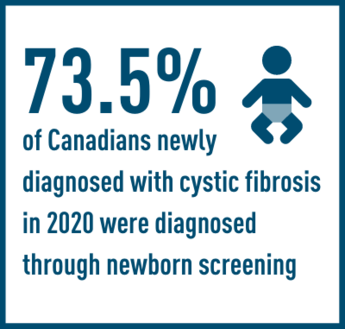CYSTIC FIBROSIS CANADA CALLS ON PROVINCES AND TERRITORIES TO IMMEDIATELY EXPAND FUNDING OF TRIKAFTA FOR 2-5 YEAR OLDS
TORONTO, December 18, 2023 – Last week, the Canadian Agency for Drugs and Technologies in Health (CADTH) recommended that provinces and territories fund the transformational cystic fibrosis drug Trikafta for Canadians aged two and older with at least one F508del gene mutation. The final recommendation brings many Canadian children one step closer to accessing this life-changing drug.
One day after the announcement from CADTH, Alberta became the first province to fund the drug for the younger age group, with funding starting on December 13, 2023. British Columbia followed shortly, announcing funding on December 14, 2023. Ontario and Nunavut have followed, adding Trikafta for children aged 2-5 years old to the appropriate public drug formularies, expanding access across these regions.
“This recent news brings Canadian families who live with CF one step closer to accessing this drug and we are calling on all remaining provinces and territories to follow the leadership of Alberta, BC, Ontario and Nunavut and immediately expand funding to 2–5-year-olds,” said Dr. Paul Eckford, Chief Scientific Officer, Cystic Fibrosis Canada. “While not a cure, starting young children on modulator therapy as early as possible could protect their health and prevent significant structural lung damage from occurring. We are pleased that CADTH has recognized the preventative benefits of the drug for young Canadians.”
Health Canada approved Trikafta for the younger age group on October 17, 2023, and CADTH issued its draft recommendation to fund the drug on October 26, 2023. On December 27, 2023, Quebec’s Institut national d’excellence en santé et en services sociaux (INESSS) published a positive recommendation on funding Trikafta for this age group. Cystic Fibrosis Canada continues to follow Quebec’s public drug formulary Régie de l'assurance maladie du Québec (RAMQ) for clarity on the province’s funding.
Canada’s Non-Insured health benefits (NIHB) for registered First Nations and recognized Inuit has also expanded to include Trikafta for ages 2-5 years old. Canadian indigenous children is this age group can now receive coverage for the drug.
In addition to calling on public drug programs to fund Trikafta for this younger age group, Cystic Fibrosis Canada continues to call on drug plans and private insurers to fund Trikafta for all who can benefit, including those with rare mutations, and remove the burden of high deductibles for families accessing the drug.
About Cystic Fibrosis
Cystic fibrosis is the most common fatal genetic disease affecting Canadian children and young adults. There is no cure. Of the Canadians with cystic fibrosis who died in the past five years, half were under the age of 37. Cystic fibrosis is a progressive, degenerative multi-system disease that affects mainly the lungs and digestive system. In the lungs, where the effects are most devastating, a build-up of thick mucus causes severe respiratory problems. Mucus and protein also build up in the digestive tract, making it difficult to digest and absorb nutrients from food. In addition to the physical effects of the disease, mental health concerns are emerging; anxiety and depression are common among this population. Double lung transplants are the final option for patients with end-stage disease; most fatalities of people with cystic fibrosis are due to lung disease.
About Cystic Fibrosis Canada
Cystic Fibrosis Canada has dramatically changed the cystic fibrosis story. We have advanced research and care that has more than doubled life expectancy. Since being founded by parents in 1960, Cystic Fibrosis Canada has grown into a leading organization with a central role engaging people living with cystic fibrosis, parents and caregivers, volunteers, researchers, and healthcare professionals, government, and donors. We work together to change lives for the more than 4,000 Canadian children and adults living with cystic fibrosis through treatments, research, information, and support. Despite our remarkable progress together, we are not yet done. Not when half of the Canadians with cystic fibrosis who died in the past five years were the age of 37. We will keep pushing, keep going further until all people with cystic fibrosis can and do experience everything life has to offer —and enjoy everything life has to offer. Learn more at cysticfibrosis.ca.
---
Updated January 5, 2024.
For more information, please contact:
Chloe Hall




